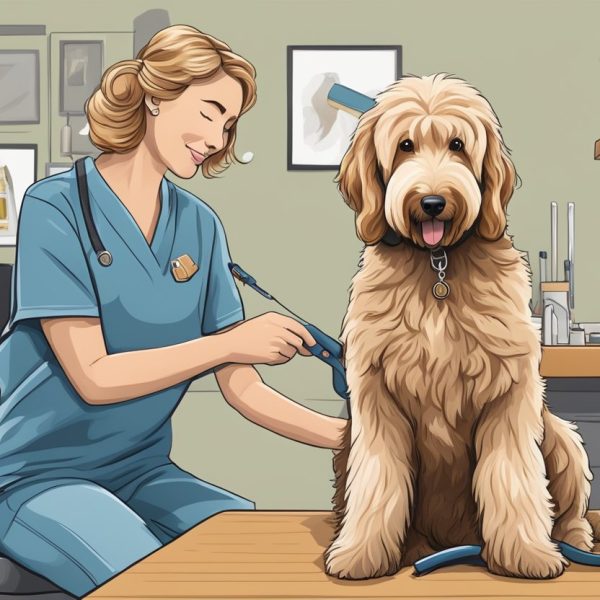Poodles are a popular breed of dog known for their intelligence, elegance, and curly coat. While they are generally healthy dogs, like all breeds, they may be prone to certain health issues. These health concerns can range from minor issues to more serious conditions that require medical attention.

One of the most common health issues in poodles is hip dysplasia. This condition occurs when the hip joint doesn’t develop properly, causing the bones to rub against each other. This can lead to pain, stiffness, and difficulty walking. Other common health issues in poodles include bloat, Addison’s disease, and thyroid issues.
As a responsible pet owner, it’s important to be aware of these potential health concerns and take steps to prevent them. Regular check-ups with a veterinarian, a healthy diet, and regular exercise can all help keep your poodle healthy and happy. By staying informed and taking proactive measures, you can help ensure that your poodle lives a long, healthy life.
Understanding Poodle Breeds
Poodles are a breed of dog that come in three distinct sizes: standard, miniature, and toy. Each size has its own unique set of characteristics and health concerns.
Standard Poodles
Standard Poodles are the largest of the three sizes, standing at over 15 inches tall at the shoulder. They are known for their intelligence, athleticism, and trainability. Standard Poodles are prone to certain health issues such as hip dysplasia, progressive retinal atrophy, and Addison’s disease. It is important for owners to monitor their Standard Poodle’s health and schedule regular check-ups with their veterinarian.
Miniature Poodles
Miniature Poodles are the middle size of the breed, standing between 10 and 15 inches tall at the shoulder. They are known for their lively personalities and affectionate nature. Miniature Poodles are prone to certain health issues such as dental problems, patellar luxation, and eye problems. Regular dental cleanings and eye exams are important for maintaining their health.
Toy Poodles
Toy Poodles are the smallest of the breed, standing at less than 10 inches tall at the shoulder. They are known for their intelligence, loyalty, and affectionate nature. Toy Poodles are prone to certain health issues such as hypoglycemia, dental problems, and collapsing trachea. Owners should monitor their Toy Poodle’s blood sugar levels and schedule regular dental check-ups.
Overall, Poodles are a relatively healthy breed, but it is important for owners to be aware of the potential health issues that can arise. Regular veterinary check-ups and preventive care can help ensure a long and healthy life for these beloved pets.
Common Health Issues in Poodles
Poodles are generally a healthy breed, but like all dogs, they can be prone to certain health issues. Here are some of the most common health issues in Poodles:
Hip Dysplasia
Hip dysplasia is a genetic condition that affects the hip joint. It occurs when the ball and socket joint of the hip do not fit together properly, causing the joint to wear down over time. This can lead to arthritis and other joint problems. Symptoms of hip dysplasia may include lameness, difficulty getting up or lying down, and reluctance to exercise. Hip dysplasia can be diagnosed with x-rays and can be treated with medication, surgery, or a combination of both.
Epilepsy
Epilepsy is a neurological disorder that causes seizures. It is a common health issue in Poodles and can be inherited or caused by other factors such as brain tumors or head injuries. Symptoms of epilepsy may include seizures, loss of consciousness, and muscle twitching. Epilepsy can be diagnosed with a neurological exam and blood tests, and can be treated with medication.
Progressive Retinal Atrophy
Progressive Retinal Atrophy (PRA) is a group of genetic diseases that cause degeneration of the retina, leading to blindness. Symptoms of PRA may include night blindness, dilated pupils, and a lack of response to light. PRA can be diagnosed with an eye exam and genetic testing, and there is currently no cure. However, there are ways to manage the disease and slow its progression.
Addison’s Disease
Addison’s Disease is a hormonal disorder that occurs when the adrenal glands do not produce enough hormones. Symptoms of Addison’s Disease may include lethargy, vomiting, diarrhea, and loss of appetite. Addison’s Disease can be diagnosed with blood tests and can be treated with medication.
Sebaceous Adenitis
Sebaceous Adenitis is a skin disease that affects the sebaceous glands, which produce oil for the skin and coat. Symptoms of Sebaceous Adenitis may include dry, scaly skin, hair loss, and skin infections. Sebaceous Adenitis can be diagnosed with a skin biopsy and can be treated with medication, but it is a lifelong condition that requires ongoing management.
These are just a few of the common health issues in Poodles. It is important to work with a reputable breeder and take your Poodle for regular check-ups with a veterinarian to help prevent and manage any health issues that may arise.
Preventive Measures for Poodle Health Issues
Poodles are susceptible to certain health issues that can affect their quality of life. However, with proper care and preventive measures, many of these health issues can be avoided or minimized. In this section, we will discuss some of the preventive measures that can help keep your Poodle healthy.
Regular Vet Check-ups
Regular vet check-ups are crucial for maintaining your Poodle’s health. It is recommended to take your Poodle to the vet at least once a year for a check-up. During these check-ups, the vet can detect any health issues early on and treat them before they become more serious. In addition, the vet can provide you with advice on how to keep your Poodle healthy, such as diet and exercise recommendations.
Balanced Diet
A balanced diet is essential for your Poodle’s health. Poodles are prone to obesity, which can lead to various health issues. Therefore, it is important to feed your Poodle a balanced diet that is appropriate for their age, size, and activity level. A diet that is high in protein, low in fat, and contains essential vitamins and minerals is ideal for Poodles. You can consult with your vet to determine the best diet for your Poodle.
Proper Exercise
Proper exercise is also important for maintaining your Poodle’s health. Regular exercise can help prevent obesity, improve cardiovascular health, and strengthen muscles and bones. However, it is important to provide your Poodle with appropriate exercise that is suitable for their age and activity level. For example, younger Poodles may require more exercise than older Poodles. You can consult with your vet to determine the appropriate exercise routine for your Poodle.
Genetic Testing
Genetic testing can help identify potential health issues in your Poodle. Some Poodle health issues, such as hip dysplasia and progressive retinal atrophy, are hereditary. Therefore, genetic testing can help identify if your Poodle is at risk for these health issues. If your Poodle is at risk, you can take preventive measures to minimize the impact of these health issues. You can consult with your vet to determine if genetic testing is appropriate for your Poodle.
By following these preventive measures, you can help keep your Poodle healthy and minimize the impact of potential health issues. Regular vet check-ups, a balanced diet, proper exercise, and genetic testing can all contribute to your Poodle’s overall health and well-being.
Treatment Options for Poodle Health Issues
Poodles, like all dogs, can experience a variety of health issues. Fortunately, many of these issues can be treated with appropriate care. Here are some common treatment options for poodle health issues:
Medication
Many poodle health issues can be treated with medication. For example, hypothyroidism can be managed with synthetic thyroid hormone medication. Addison’s disease can be treated with corticosteroids and mineralocorticoids. Epilepsy can be managed with anti-seizure medication. It is important to work with a veterinarian to determine the appropriate medication and dosage for your poodle’s specific health issue.
Surgery
In some cases, surgery may be necessary to treat a poodle’s health issue. For example, luxating patella, a condition where the kneecap dislocates, may require surgery to correct. Bloat, a life-threatening condition where the stomach fills with gas and twists, requires immediate surgical intervention. It is important to work with a veterinarian to determine if surgery is necessary and to find a qualified surgeon if needed.
Physical Therapy
Physical therapy can be helpful for poodles with certain health issues, such as hip dysplasia or after surgery. Physical therapy can include exercises to strengthen muscles and improve range of motion, as well as massage and hydrotherapy. It is important to work with a veterinarian or certified canine rehabilitation therapist to determine the appropriate physical therapy plan for your poodle.
Alternative Therapies
In addition to traditional medical treatments, there are also alternative therapies that can be used to treat poodle health issues. These can include acupuncture, herbal remedies, and chiropractic care. It is important to work with a veterinarian or certified alternative medicine practitioner to determine the appropriate alternative therapy for your poodle’s specific health issue.
Overall, there are a variety of treatment options available for poodle health issues. It is important to work with a veterinarian to determine the appropriate treatment plan for your poodle’s specific health issue.
Long-Term Management of Health Issues
Poodles, like any other breed, can develop chronic health conditions that can impact their quality of life. Therefore, it is essential to understand that chronic health conditions are long-term health issues that require ongoing care and management. Here are some tips for the long-term management of health issues in poodles:
Regular Vet Visits
Regular vet visits are essential for the early detection and management of chronic health conditions. Poodle owners should schedule regular check-ups with their veterinarian to ensure that their dog is healthy and to identify any potential health concerns early on.
Medication Management
If a poodle has a chronic health condition, medication management is essential. Owners should ensure that their poodle is taking medication as prescribed by the veterinarian. Medication adherence is crucial for the successful management of chronic health conditions.
Diet and Exercise
Diet and exercise are important for the long-term management of chronic health conditions in poodles. A balanced diet and regular exercise can help manage weight, which can help prevent or manage conditions such as hip dysplasia and arthritis.
Supportive Care
Supportive care is essential for the long-term management of chronic health conditions in poodles. Owners should provide their poodle with supportive care, such as physical therapy, massage, and acupuncture, to help manage pain and improve mobility.
Monitoring Symptoms
Owners should monitor their poodle’s symptoms regularly and report any changes to their veterinarian. Early detection and management of symptoms can help prevent complications and improve the quality of life for poodles with chronic health conditions.
In summary, the long-term management of health issues in poodles requires regular vet visits, medication management, a balanced diet and regular exercise, supportive care, and monitoring of symptoms. Poodle owners should work closely with their veterinarian to develop a comprehensive management plan that meets the unique needs of their poodle.
Conclusion
In conclusion, poodles are a popular breed of dogs that can be prone to several health issues. Some of the common health issues that poodles may experience include bloat, Addison’s disease, hip dysplasia, thyroid issues, progressive retinal atrophy, luxating patella, epilepsy, and hypoglycemia.
Hypothyroidism is a common health issue in poodles that occurs when the thyroid gland produces less thyroid hormone than is needed to properly regulate metabolism. This can result in disruption in heart rate, temperature, and a variety of other negative physical effects on the dog.
Epilepsy is another health issue that poodles may experience. It is an inherited seizure disorder that can occur for many reasons, including low blood sugar or brain disease.
It is important for poodle owners to be aware of the potential health issues that their dogs may experience and to take appropriate measures to prevent or treat them. Regular visits to the vet, a healthy diet, and exercise can help keep poodles healthy and happy.
Overall, poodles are intelligent, loyal, and loving dogs that make great companions. With proper care and attention, they can live long and healthy lives.










